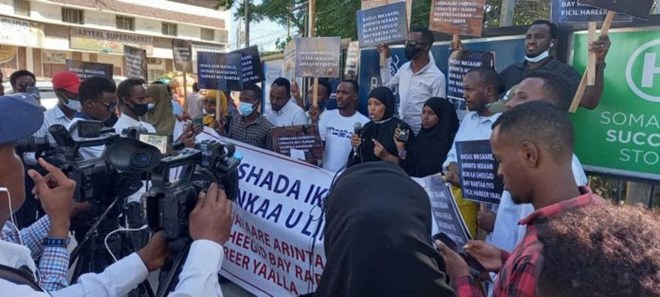With Somalia’s delayed elections pushed back again, the country’s media are digging in for what has already been a lengthy and at times difficult election period.
Journalists reporting on politics and opposition candidates have been assaulted and detained, and a state leader threatened unspecified consequences for media who “exaggerate the menace” of the militant group al-Shabab, according to a report by the Somali Journalists Syndicate (SJS).
“Journalists are taking increasing risks throughout Somalia,” Abdalle Ahmed Mumin, the secretary general of SJS, told VOA. “The various attacks against reporters increased in 2021, in physical attacks, intimidation, harassment, or targeted cyber bullying.”
When it comes to political coverage, the syndicate found cases where federal and state authorities “deliberately blocked, detained, harassed, and threatened journalists covering elections.”
The Somali embassy did not respond to a request for comment.
Pressure on media covering election campaigns and rallies is a trend seen globally, media experts say.
“During elections, press freedom is truly tested. It’s when we’re likely to see a state’s true colors appear,” said Muthoki Mumo, of the Committee to Protect Journalists.
Political beat
In delaying the parliamentary elections slated for last Friday, Somali lawmakers last week cited a lack of funding and security.
The vote is already a year behind, after disagreements between the government and opposition resulted in delays. The militant Islamist group al-Shabab had also vowed to disrupt the vote and warned Somalis to stay away from the polls.
Voting is now scheduled to take place in mid-March.
Journalists covering early rounds of voting and election campaigns, or investigating irregularities, have been obstructed, harassed or detained, the SJS report found.
Authorities in Galmudug, central Somalia, blocked journalists from filming a polling station during the selection of delegates in November. The news team were reporting on allegations of malpractice, SJS reported.
In South West state, security officials detained eight journalists covering the arrival in the region of the state’s former president Sharif Hassan Sheikh Adan, who is a candidate in elections.
And in January, police in Hirshabelle detained seven radio journalists just two hours after they broadcast an interview with an opposition group.
The trend raises concerns that Somali reporters and media outlets may self-censor.
“The attacks on journalists that you know about are the tip of the iceberg. You don’t know what stories specific journalists are going to shy away from in the future. The stories that are not told are difficult to quantify,” Mumo said.
Legal threats
Somalia’s media already work in a challenging environment, with 65 journalists arrested and two killed in the past year.
Media watchdog Reporters Without Borders describes Somalia as “Africa’s most dangerous country” for the press, saying journalists are under pressure from government and militants.
The country ranks 161 out of 180 countries, where 1 is freest, on the World Press Freedom Index.
Attempts to improve conditions have fallen short, Mumin said.
Somalia in 2020 announced a special prosecutor for crimes against journalists. However, the SJP report said it has failed to secure any prosecutions.
“Somalia is one of the countries where accountability is one of the key issues of media freedom, so we must see government accountability around their dealings with press freedom,” Mumin said.
The CPJ’s Mumo agreed, saying, “The threats don’t just come from one direction.”
“Many of the journalists have been killed by al-Shabab,” Mumo said. But she added, “The state security forces that are supposed to be there, providing a protected environment for you to do your job freely, are also coming at you.”
An Islamist militant group designated as terrorist by the U.S., al-Shabab is fighting for control of Somalia and carries out regular bombings and attacks.
The militants claimed responsibility for the deaths of both journalists killed in 2021.
Somalia’s journalists need an end to impunity and policies that target journalists, Mumin said, adding, “We want to see Somalia allowing journalists access to information.”
Source VOA

